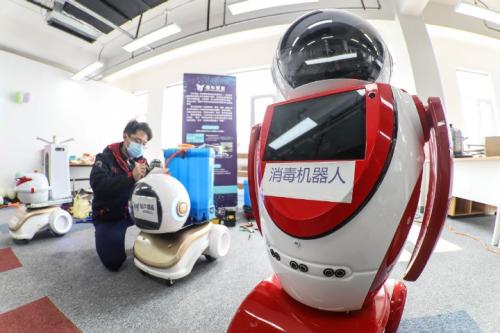




A technician adjusts a disinfection robot at a robot manufacturer in Qingdao, Shandong province. XIE HAO/FOR CHINA DAILY
From disinfection and street patrols to food and medicine delivery in quarantine wards, robots have been deployed to the front line to contain the spread of the novel coronavirus pneumonia, thanks to the rapid development of China's artificial intelligence sector.
More than 30 disinfection robots designed and produced by a Shanghai enterprise have been used in major hospitals in Wuhan, the epicenter of the outbreak.
The white robot has a hydrogen peroxide sprayer on its "head" and nine ultraviolet lamps in its "belly", and can perform multiple forms of disinfection in environments where humans and machines coexist, according to Pan Jing, CEO of Shanghai TMiRob, the manufacturer of the machines.
Navigation technology enables the robots to avoid obstacles, Pan said.
At present, such disinfection robots have been used at isolation wards, intensive care units, operating rooms and fever clinics in Wuhan's major coronavirus hospitals including the Central Hospital of Wuhan to provide round-the-clock disinfection service.
Siasun, the country's major robot manufacturer, donated 21 robots and 10 electric adjustable beds to frontline hospitals and other institutions in Shenyang, Liaoning province.
With advanced technologies such as laser positioning, intelligent navigation and human-computer interaction, the medical delivery robots can assist health workers with spraying disinfectants and handing out medicine to patients.
The electric adjustable beds allow infected patients to eat in bed and help them sit up and roll over, while the food delivery robots, which can recognize human faces and voices, are able to provide services to visitors from areas severely hit by the virus, so as to help people avoid close contact with others.
Siasun and the Shenyang Institute of Automation of the Chinese Academy of Sciences are also developing a robot that can replace nurses in conducting throat tests for the virus.
In Shandong province, Qingdao Webull Intelligent Technology has donated 30 disinfection robots to work in six hospitals in Qingdao and Rizhao cities since the end of January, and more robots are expected to be allocated in all of the province's 20 hospitals.
"Intelligent robotic products can effectively replace doctors and nurses in some tasks, thus reducing their chances of being infected," said Lu Yun, director of general surgery of the Huangdao Campus of Affiliated Hospital of Qingdao University.
On Feb 3, robot maker CloudMinds and China Mobile's Shanghai branch donated the first batch of 5G-powered robots to a Shanghai hospital. With the 5G network, the robots can help medical staff carry out tasks involving consultations, disinfection, cleaning and drug delivery.
China has called on the country's AI sector to lend a technological hand to help battle the epidemic.
Research and development should be enhanced and industrial cooperation is encouraged to contribute to the discovery, awareness and control of the epidemic, the Ministry of Industry and Information Technology said in a proposal on Feb 6.
Related AI technologies could be applied to roll out smart devices to support diagnosis and treatment, and used in telecommuting, online education and intelligent production, in a bid to ensure minimal disruption to people's lives, according to the proposal.
Xinhua contributed to this story.
If you have any problems with this article, please contact us at app@chinadaily.com.cn and we'll immediately get back to you.